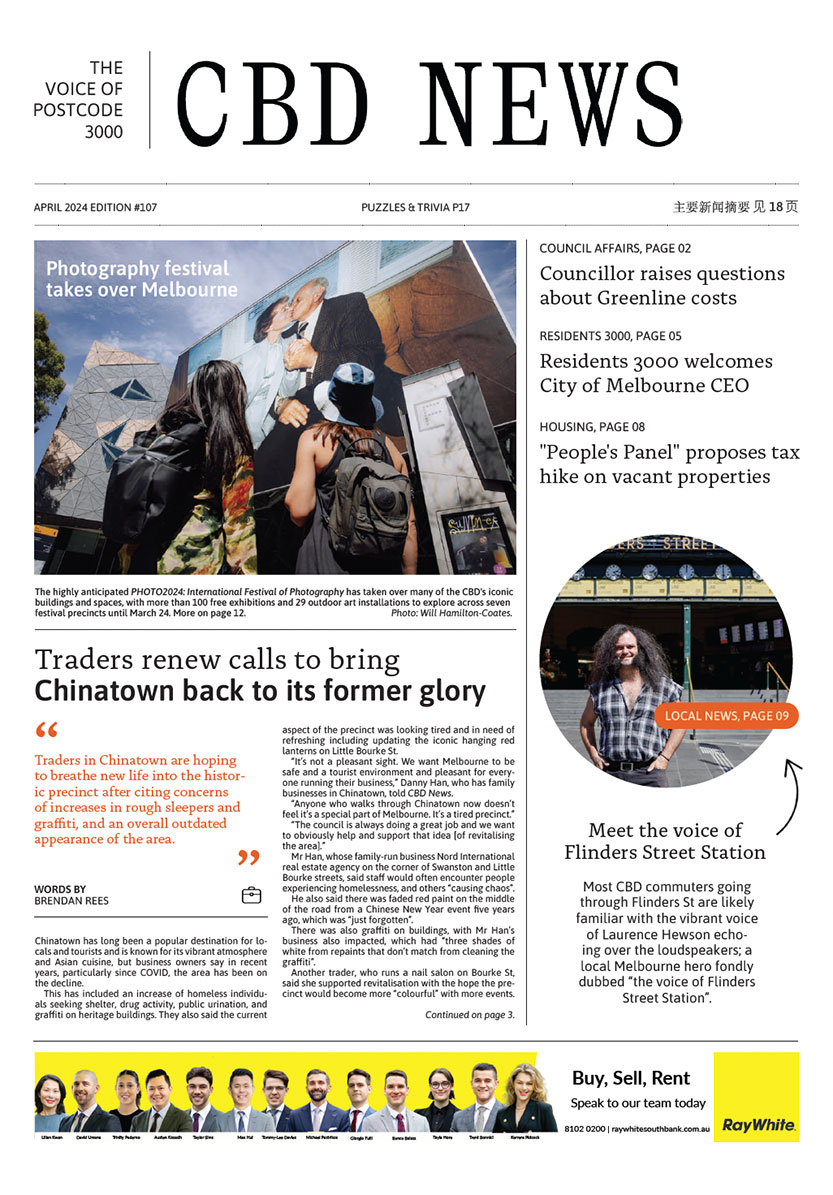A true community councillor
By Sean Car
When CBD News’s sister publication Docklands News ran Jamal Hakim’s image on the front page of its September 2020 edition ahead of last year’s City of Melbourne council elections, he really would have liked his chances!
And sure enough, the long-term Docklands resident, multicultural campaigner and managing director of a national health not-for-profit defied the odds and snuck into one of the nine coveted councillor positions … not that we’re suggesting our help had anything to do with his success!
Off the back of some clever preferences with other like-minded resident candidates and an “open and honest” dialogue with the rest of the field, Mr Hakim said he had always remained optimistic about his chances.
“I take things in my stride, I guess,” he said. “I’m the kind of person that leaves myself open to all possibilities. So, part of me did feel optimistic. But at the same time, I was realistic that it’s the first time I’m running and I’m an unknown character.”
“I went into the preference discussions the same way I would any other negotiation, which is to align from a values perspective. Have those conversations, be really honest and look at the policies of the other candidates.”
“My goal was to work with the other resident candidates to say, let’s get an independent resident on council. It doesn’t matter who it is.”
Mr Hakim is one of six new faces on the council and his election to the City of Melbourne should come as welcome news to local residents throughout the municipality, given his pledge to carry his own lived experience into the role.
Not only has he lived in Docklands for more than 10 years, his professional experience working with Democracy in Colour, Marie Stopes and previously with Midsumma Festival means community will be central to his approach as a councillor.
Having been assigned the Creative Melbourne portfolio and deputy lead on the Health, Wellbeing and Belonging portfolio, he told CBD News that he was passionate about promoting multiculturalism, safety and deliberative government in our city.
“I think safety in the city is a really big issue because it underpins everything,” he said.
“People feel less safe in the City of Melbourne year on year and that’s probably because we’re not understanding what safety encompasses – it’s emotional, psychological, cultural, accessibility, environmental and all sorts of things.”
“Deliberative government is also something that I’m really interested in. We really need to create a way of collaboration that takes into account our community in all of its forms.”
“About 70 per cent of the recommendations from deliberative processes in Scotland are enacted. I think when you have that you have a more engaged community. You have to represent community realistically and be able to show representation within council.”
While Jamal’s life is about to get a whole lot busier as a councillor, he is no stranger to a full workload having only recently completed his Juris Doctor (JD) at RMIT University so expect him to take the juggle in his stride!
He said that the combined fresh talent of fellow new councillors Jason Chang, Olivia Ball, Elizabeth Doidge, Davydd Griffiths and Roshena Campbell, with the experience of Lord Mayor Sally Capp, Deputy Lord Mayor Nicholas Reece and councillors Kevin Louey, Rohan Leppert and Phil Le Liu placed the group in good stead for a productive and pragmatic council term.
“What’s really terrific about this council, and I can say this confidently, after meeting and sitting down with everyone individually is that we really got to know each other and we all set some ground rules around our behaviours and how we want to engage together,” he said.
“What came from that was that we have a bunch of councillors who don’t necessarily agree on everything, but they agree on the way we want to interact. Everyone wants to go into this in a way that is positive and be soft on people and hard on issues.”
“All eyes will be on council post-pandemic and I think everyone is conscious of that fact in that whatever we do in this term will have implications for years and years to come – similar to what happened with Postcode 3000 and some of the other major changes in Melbourne.”
“What we do with a city that is really changing in terms of how communities and businesses interact and how people’s livelihoods are going to be impacted is going to be a challenge, but an opportunity to do things better.”

Backloading across borders with Transcorp – navigating interstate moves with ease



 Download the Latest Edition
Download the Latest Edition